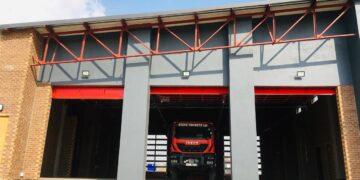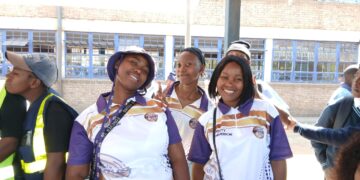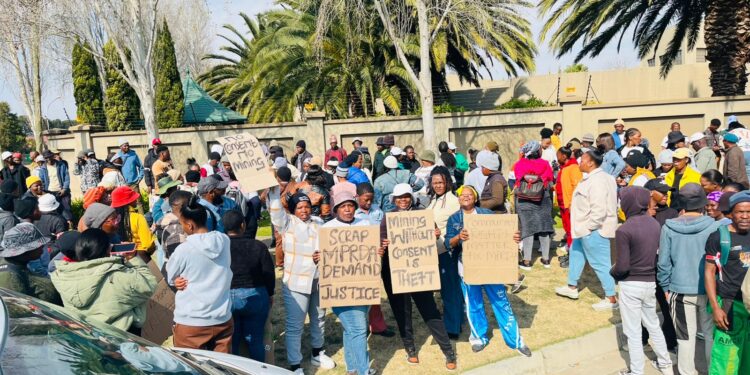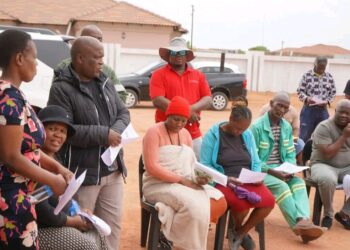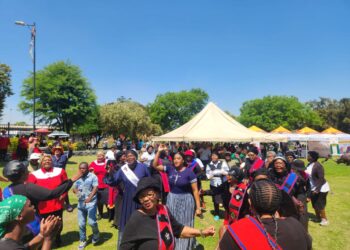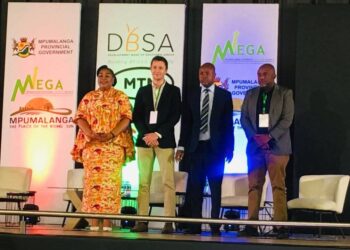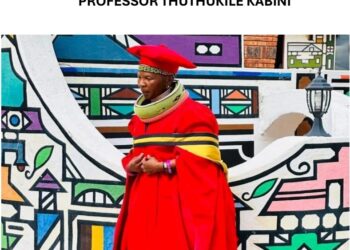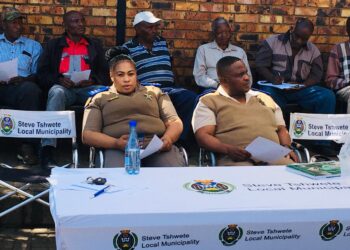The Mining Affected Communities United in Action (MACUA), which organises communities across the country, marched to different offices of the Department of Mineral and Petroleum Resources (DMPR) to challenge and resist the 2025 MPRDA Amendment Bill.
MACUA, along with alongside the South African National Civic Organisation (SANCO) and other civil society organisations marched on 13 August 2025 to DMPR offices in Tshwane (Gauteng) Welkom (Free State) and regional offices in Klerksdorp (North West), Emalahleni (Mpumalanga) and Polokwane (Limpopo).
This was more than just banners and chants, it was a defining moment in the ongoing fights of mining-affected communities. Together, the communities demanded nothing less than justice, dignity and accountability from DMPR.
The marches were peaceful yet resolute, carrying submissions that communities can no longer be sidelined in shaping decisions that determine their futures.
Mining still drives South Africa’s economy, yet it leaves behind a trail of dispossession, deep inequality and environmental destruction. Marginalised and mining affected communities carry the weight of health crises, social instabilities, land degradation and pollution. We remain excluded and misrepresented in decisions about mining rights, land use and community development.
For these reasons, the Mineral and Petroleum Resources Development Act (MPRDA) lies at the heart of our struggles. Both the current Act and the proposed amendments gazetted for public comment earlier this year, centralises power in the state and corporations and silences communities.
This ‘development’ prioritises extraction and profit over people. On paper, consultations processes require companies to notify communities, provide information and engage on Social and Labour Plans (SLPs), including updates and published commitments.
The system is broken and unjust
At face value, this may seem progressive but in reality the system is broken and unjust. Consultation is often reduced to a mere tick-box exercise conducted at the expense of communities.
The mass action reflected the frustration of communities who are long fed up with the status quo, where mining companies frequently meet only minimum legal requirements, sending notices or holding brief meetings that serve little more than formality.
For instance, on 07 August, the DMPR held a “community consultation” on the Mineral and Petroleum Resources Development Amendment Bill 2025 in Emalahleni and Carolina, Mpumalanga. Community members united in rejecting the hollow and disingenuous process.
This exemplifies the “tick-box exercise” that the state and mining companies use to claim they are “including” communities. These so-called “engagements” often resemble business meetings more than genuine consultations, ignoring the profound impacts of mining on land, water and health. Legal obligations are reduced to paperwork rather than a living process of democratic participation.
Soon after the bill was gazetted for public comment, MACUA organised MPRDA consultative workshops to collect feedback from communities on the proposed changes. Unsurprisingly, most community members were unaware that the MPRDA was open to public comment. The department continues to fail in holding sessions with communities on mining laws and everything affecting them.
These workshops confirmed what MACUA has long argued: the DMPR excludes communities, and the lack of education deepens that exclusion. MACUA entered these communities almost “blind”, trying to educate them on what the MPRDA is, and why it is crucial to make comments on the proposed amendments. There was a huge gap.
Changing the definition of community
The bill, which fails to reflect the realities of our communities, proposes, among other changes, to change the definition of community. The proposed definition sees a “community” as a coherent, social group of persons within a metropolitan municipality or a district municipality.
This would replace the existing definition, which currently states: ‘community’ means a group of historically disadvantaged persons with interest or rights in a particular area of land on which the members have or exercise communal rights in terms of an agreement, custom or law.
This change poses a serious problem for our communities, as it excludes historically disadvantaged persons and weakens the constitutional mandate for redress, restitution and equitable access.
By defining communities as coherent, social groups within a metropolitan or district municipality, shifts to administrative geography from land-based and tenure-based criteria. This introduces ambiguity and may exclude traditional rural communities and marginalised communities who do not fit into a single “coherent social group.”
The march symbolised a collective rejection of this injustice. It brought together voices long sidelined: women bearing the heavy burden of caring family members afflicted by mining-related illnesses, young people whose futures are threatened by unemployment and environmental collapse.
Calling for change in the MPRDA is not merely about revising legislation but it is about reshaping the relationship between communities, the state and corporations. It demands transparency, accountability, and meaningful participation while ensuring that laws uphold the constitutional rights of communities to live in an environment that is not harmful to their health and well-being.
*Tholakele Thabane works under the media unit of the nonprofit MACUA-WAMUA Advice Office, which provides administrative support to Mining Affected Communities United in Action (MACUA) members across the country.


